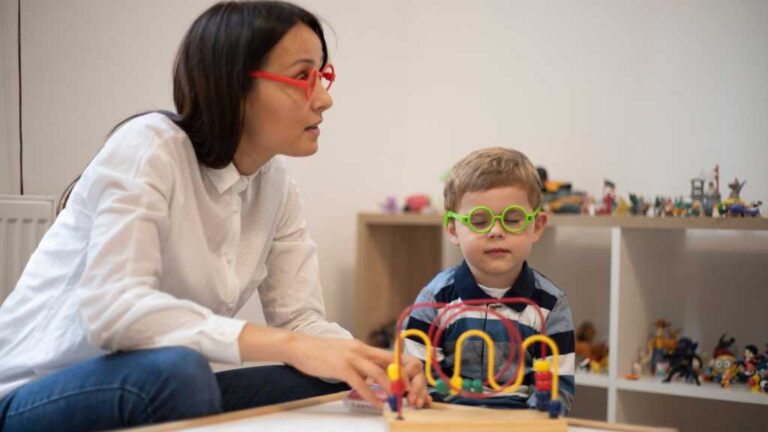It can be difficult for children diagnosed with autism spectrum disorder (ASD) to come out of their shells. Play therapy, rooted in Applied BehHow Does ABA Therapy Work? | ABA Centers of Florida (abacentersfl.com)avior Analysis (ABA) methods, has recently gained popularity. ABA is the only recognized form of therapy for those on the spectrum, individualized to teach valuable skills through positive reinforcement.
When ABA utilizes play, the two methods can teach healthy behaviors in children with ASD. Play-based ABA therapy is child-centered. Unlike other traditional forms of therapy, which often involve adult-directed instruction, play-based ABA therapy hones the child’s interests and motivations. The therapist observes and engages with the child during play and uses their interests to guide the learning process.
At ABA Centers of Florida, we are experts in individualized therapy that best fits the needs of your child and family. Hence, we understand and use play therapy to bring about the innate talents of children with autism. This article will explore the benefits of letting your child explore therapy at their own pace in a safe play-based environment.
What Is Play Therapy?
The point of play therapy is to foster skills that children on the spectrum find challenging to discover on their own. These include sharing, joint attention (paying attention to something with someone else) or engaging in symbolic thought. Children diagnosed with ASD play unlike their peers; they often prefer to be alone and create strict rules around their play that they do not change from session to session. Examples include constructing a puzzle the same way, taking it apart at the end, or placing toys in a line but not interacting with them further.
These preferences do not mean they are opposed to or incapable of discovering, just that they need help getting there. An ABA therapist can follow their cues using various play-based techniques, such as storytelling, puppetry, art, and music, to help the child express themselves and work through their emotions.
The Benefits of Play Therapy
One traditional criticism against ABA therapy is that it can be difficult and draining. Such caution reflects a decades-old misconception, mainly when play is at the center of therapy. The following are some advantages of play-based therapy.
1. Play Therapy Is Natural
One of the most effective ways of teaching is when the pupil doesn’t realize they are learning! Play-based ABA therapy uses naturalistic teaching strategies to teach skills in a natural setting. The therapist works with the child during play, using the toys and activities the child is interested in rather than relying on structured drills and exercises.
2. Play Therapy Is Social
Play is the perfect context for practicing social communication skills such as turn-taking, joint attention, politeness, empathy, and sharing. Neurodivergent children have rich backstories and roles for their toys, which can serve as a model for real-world scenarios and teach valuable social lessons. Play-based ABA therapy uses play to reinforce skills essential for building relationships and interacting with others.
3. Play Therapy Is Engaging
Children on the spectrum often have difficulty staying engaged in structured activities and may struggle with motivation. One of the hallmarks of ASD is a preference for the routine, and those on the spectrum can struggle to adapt when their typical patterns are interrupted. Play therapy uses the child’s interests and motivations to keep them engaged in learning. The therapist can create a fun and engaging learning environment by using toys and activities that the child enjoys.
4. Play Therapy Is Flexible
Children play at different levels and in different ways. Some like action and fights with toys, others play with everyday activities like doctor and dress up, and others prefer calm building with Legos or puzzle pieces. Play therapy is adapted to meet the needs and abilities of individual children. The therapist can adjust the level of support and the complexity of the activities based on the child’s progress and preferences.
5. Play Therapy Teaches Universal Skills
Socialization is the primary way children learn life skills. Whether by mimicry or simply watching others do things and picking up on patterns, kids develop a personal inventory of behaviors that help them operate daily. Those on the spectrum find it difficult to relate, so they don’t place much weight on replicating other people’s behavior.
One of the goals of play therapy is to help children generalize these skills to everyday situations. Play effectively promotes the generalization of skills because play can encompass so much, yet it is make-believe, so there’s no pressure to get it all exactly right. Children manage and resolve complex imaginary scenarios and storylines during play without facing any consequences. Play allows them to explore and make mistakes they otherwise couldn’t when interacting with their elders or peers. The skills learned during play get transferred to other contexts, such as school, home, workplace, and community settings.
6. Play Therapy Reduces Anxiety and Stress
Play therapy can be less intimidating and stressful for children on the spectrum than any other form of instruction. It’s where they feel the safest and where they remain in control. Instead of being told what to do, where to sit, and when to talk, or feeling as if they are monitored and graded, the therapist follows the child’s lead. Play therapy helps reduce anxiety and stress and makes the learning experience more enjoyable.
7. Play Therapy Improves Parent-Child Relationships
Kids on the spectrum can face many challenges, such as peer bullying. Because of these difficulties, it’s essential for kids on the spectrum to have a strong bond with their parents and feel comfortable sharing their emotions. Play-based ABA therapy often involves parent participation, which can improve the parent-child relationship. Parents can learn to use play-based strategies to interact with their children and reinforce the skills they learn in therapy. Play therapy improves communication, increases social engagement, and creates a stronger bond between parent and child.
ABA Centers of Florida and Play Therapy
At ABA Centers of Florida, our team wants your child to experience healthy growth toward independence and happiness. That’s why our team of experts offers individualized, play-based ABA therapy that can develop your child’s strengths while working on any lagging areas of development. We support creating an atmosphere where they can socialize, be themselves, and host and participate in autism-friendly events within the community.
If you are interested in watching your child excel and benefit from what life offers, call (772) 773-1437 or contact us on our website.








